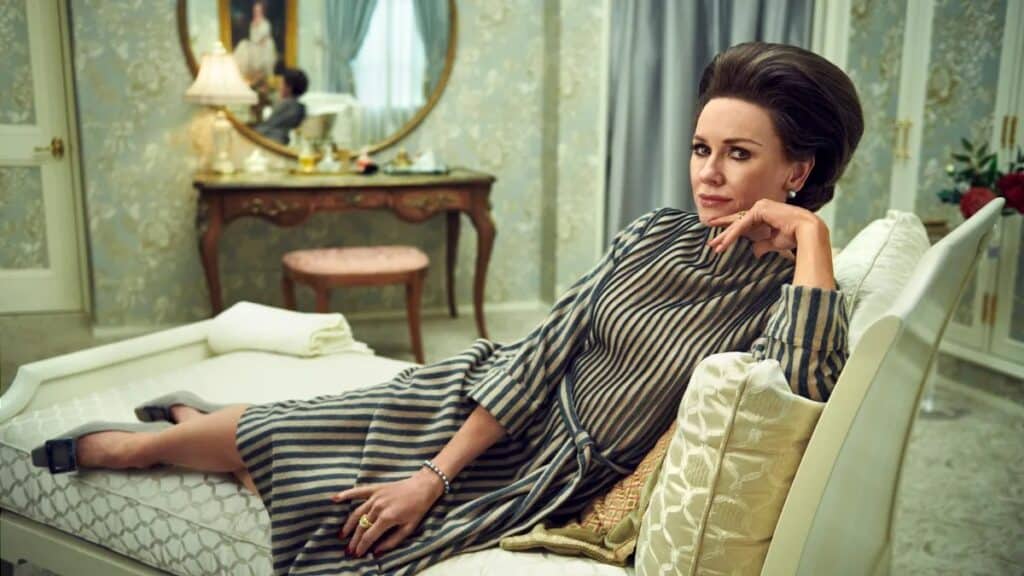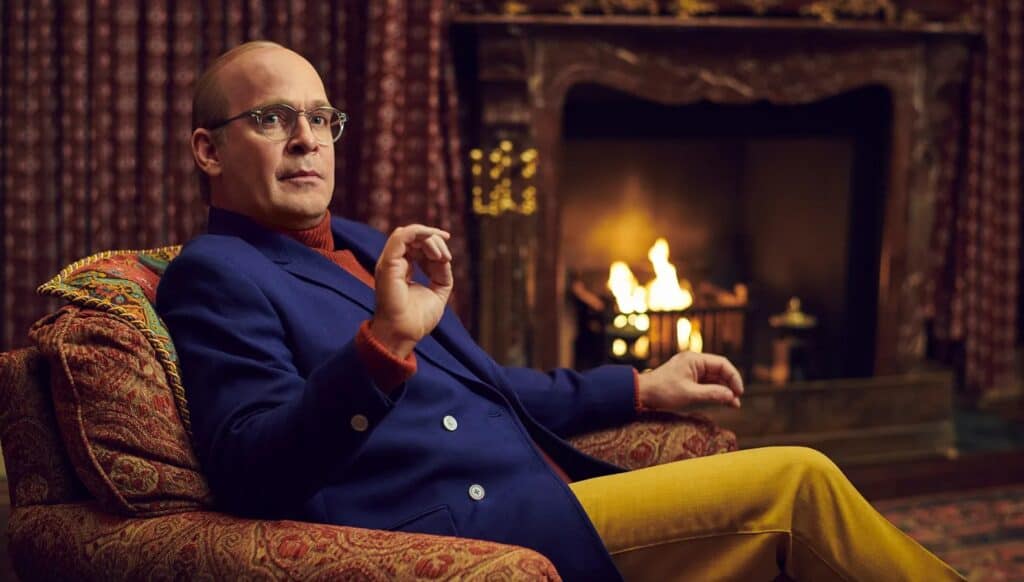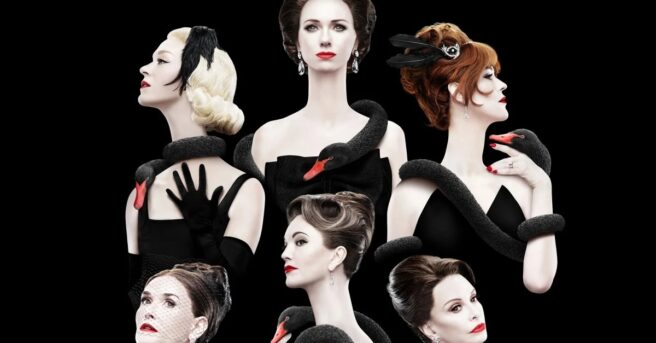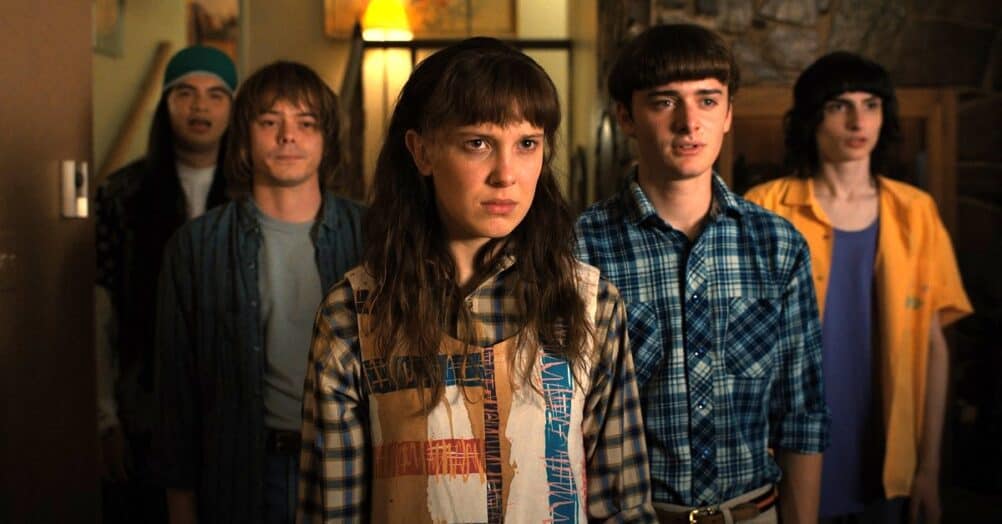Plot: Acclaimed writer Truman Capote surrounded himself with a coterie of society’s most elite women – rich, glamorous socialites who defined a bygone era of high society New York – whom he nicknamed “the swans.” Enchanted and captivated by these doyennes, Capote ingratiated himself into their lives, befriending them and becoming their confidante, only to ultimately betray them by writing a thinly veiled fictionalization of their lives, exposing their most intimate secrets. When an excerpt from the book, Answered Prayers, Capote’s planned magnum opus, was published in Esquire, it effectively destroyed his relationship with his swans, banished him from the high society he so loved and sent him into a spiral of self-destruction from which he would ultimately never recover.
Review: It has been six years since Ryan Murphy’s debut season of Feud chronicled the difficult relationship between Bette Davis and Joan Crawford. That stellar series was a brilliant showcase for Susan Sarandon and Jessica Lange. In the years since, Murphy has delivered a mixed bag of series for Netflix, including Hollywood, The Politician, Ratched, The Watcher, and Halston, as well as the massive hit Dahmer: Monster – The Jeffrey Dahmer Story. Now, the producer who shepherded Nip/Tuck, Glee, American Horror Story, and 9-1-1 is back for a new season of Feud, this time without any writing or directing credits. Turning over creative control to a new writer and veteran filmmaker, Gus Van Sant, Feud delivers the soapy and intricate melodrama of Truman Capote and his rich friends, dubbed The Swans. Feud: Capote vs. The Swans is a fantastic story that offers a new angle on one of the most infamous writers of the twentieth century.

As interesting a story as this is, aligning the rivalry between Truman Capote and The Swans is not what initially would have expected for Feud’s sophomore season. What was initially set to chronicle the divorce of King Charles III and Diana Spencer never came to fruition as that story became material for Netflix’s The Crown as well as Kristen Stewart’s film Spencer. Instead, this season looks at a story that is lighter on actual feuding and serves more as a chronicle of Truman Capote’s fall from grace. Capote’s life has been adapted in the acclaimed films Capote, which earned the late Philip Seymour Hoffman an Oscar, and Infamous, an underrated gem starring the fantastic Toby Jones. The latter film did feature a couple of the Swans in Slim Keith (Hope Davis) and Babe Paley (Sigourney Weaver), but was more focused on Capote’s success with In Cold Blood than the more tumultuous aspects of his life. Feud does not shy away from Capote’s thirst for celebrity or his addictive habits. This series is as much a look into the lives of Slim Keith and Babe Paley, here played by Naomi Watts and Diane Lane, but is even more of a showcase for Tom Hollander as Capote.
Capote vs. The Swans shifts back and forth across the decades from the 1950s, when Capote and Babe Paley first met, to the 1975 publication of “La Cote Basque” which initiated the titular feud, through to Capote’s death in 1984. Along that journey, we see the friendships that Capote forms, primarily with Paley, who comes to rely on him as a close friend and confidante. Paley was married to CBS founder William S. Paley (Treat Williams, in his final performance) and met Capote through Hollywood mogul David Selznick. Hollander channels Capote’s effortless magnetism which made him the center of every party and allowed him to ingratiate himself into the lives of the wealthy elite. Through Paley, Capote befriends Slim Keith, wife of Howard Hawks, and British aristocrat Kenneth Keith, C.Z. Guest (Chloe Sevigny), an actress and designer, and Lee Radziwill (Calista Flockhart), the younger sister of Jackie Kennedy. Capote also meets Ann Woodward (Demi Moore), a fallen socialite accused of murdering her husband, as well as Joanne Carson (Molly Ringwald), the wife of Johnny Carson. All of these women enter Capote’s life with varying degrees of friendship but eventually, lines are drawn when Capote uses his insider knowledge of their intimate secrets.
Unable to meet the success of Breakfast at Tiffany’s and In Cold Blood, Capote repeatedly misses deadlines with his publisher when he decides to write the thinly veiled novel Unanswered Prayers. When chapters are published in Esquire, Paley, Keith, and the rest of the Swans are appalled that their friend dished on their lives. As the rift widens between them, we see how the veneer of the upper one percent can crack through shame, rumor, and gossip. We also see how Capote pays the price. The bulk of this season of Feud is centered on the performances of Naomi Watts and Diane Lane with Flockhart and Sevigny in supporting roles. Demi Moore is excellent as is Molly Ringwald, but both of their roles are minor compared to the others. Equally good in this cast are Jessica Lange as Capote’s mother, Lillie Mae Faulk, Chris Chalk as James Baldwin, and Joe Mantello as Capote’s long-term partner, Jack Dunphy. Tom Hollander is exceptional and may even give a better portrayal of Capote than Hoffman and Jones combined. This series never forays into the expected pulpiness of many Ryan Murphy productions and instead is a solid drama chock full of backstabbing and name-calling that you cannot help but love to watch.
All eight episodes of Feud: Capote vs. The Swans were written by Jon Robin Baitz. Best known for his work as a playwright, Baitz wrote the excellent 2015 film Stonewall as well as episodes of series including The West Wing and Alias. Baitz condenses thirty years of storytelling as well as flashbacks even furth in the past into a comprehensive saga that gives equal measure to Capote’s life as well as Paley, Keith, and more. Not a true biopic, this series is a much larger vision of Truman Capote than we have seen on screen before and succeeds mainly because of Ryan Murphy’s lack of direct involvement. Gus Van Sant, who has not directed a film or series since 2018’s He Won’t Get Far On Foot, helmed six of the eight episodes this season, the other two were directed by Max Winkler and Jennifer Lynch, themselves the children of famous parents. Van Sant offers a controlled lens for this series but one that is period-specific and character-driven rather than anything too flashy. The acclaimed director makes sure to put the focus on this brilliant ensemble, especially Watts and Hollander. Only in the final episode does the series lose some cohesiveness and almost lose the narrative entirely with some storytelling techniques that border on the surreal.

Capote Vs. The Swans is completely and utterly distinct from Betty and Joan and that is what makes this entry in Feud so engrossing. Should we get a third chapter in this anthology, I hope it continues to distinguish itself as this sophomore run has from the first. Ryan Murphy is at times a better producer than showrunner and by handing this tale off to others it has allowed this story to be told free of any preconceived notions. The entire cast is great with Tom Hollander likely to garner many nominations come awards season, but this series is owned by the actresses. Feud has proven to be a series where female characters can exist without regard to age and based purely on their talent as performers. Aside from a bit of a stumble in the home stretch, Feud: Capote Vs. The Swans is what audiences are hoping for when they watch reality television dreck like the Real Housewives shows. They don’t make stories like this anymore and the fact that it is based on a true story makes it even more enjoyably decadent.
Feud: Capote Vs. The Swans premieres on January 31st on FX.

















Follow the JOBLO MOVIE NETWORK
Follow us on YOUTUBE
Follow ARROW IN THE HEAD
Follow AITH on YOUTUBE